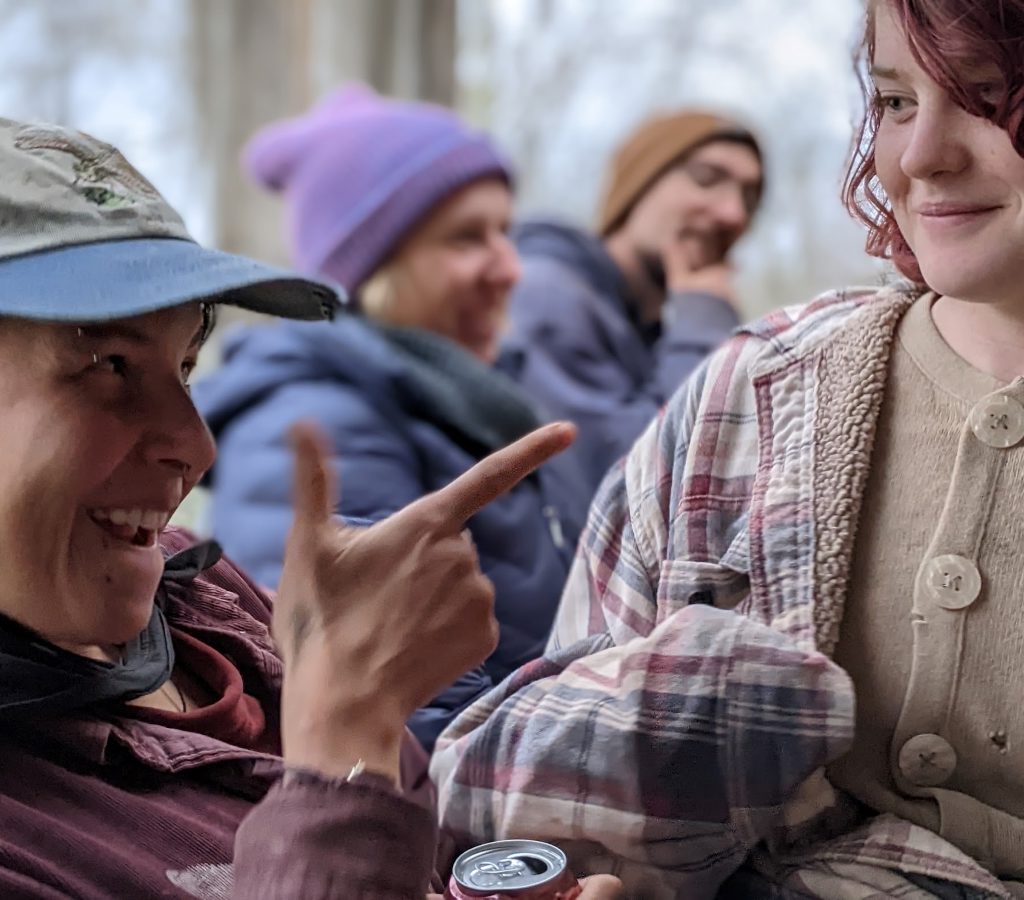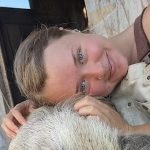
Are we back to normal? This seems to be the question floating around the village these days. And there have been moments this spring when the answer has felt like a yes. Like during a particularly lively potluck with the visitors last week, which brought attendees a healthy serving of friendly chatter, shrieking children, and some of the season’s first home-grown greens. Or during the rambunctious jam session which followed, filling the Common House with live music for the first time in a long time. As the walls hummed with strings, drums, and full-throated singing I couldn’t help but hope that the space was being reclaimed in some way. Reclaimed from the controversy and strife of the past few years and reinstated as a hub of community participation.
Emeshe here, reporting that it’s been easy for me to feel hopeful this season with the return of community dances, in-person meetings, song circles, and work parties to the rotation of things to do around the village. There is pleasure in having some hustle and bustle after the stillness and solitude of winter. I like that there’s plenty to do around here, and having never spent a spring in Missouri before, I have loved the abundance of blossoming trees, lush grass, and rain. As someone from ever-arid Colorado, I feel enamored with a landscape that is verdant instead of parched, and pastoral instead of severe.
There is, however, a cautious quality to the optimism I have felt during these weeks. We are still in uncertain times and, in many ways, I’m not sure we know what “normal” is. Many of us have faced trauma, isolation, fear, and loss. We have seen the ugliness that these things can bring out in ourselves and the people around us. We have seen the ways in which financial, emotional, and physical stress can push people to speak words that are hurtful, can drain away easy good will, and can bring out unexpected harshness and judgment. Now we sit with many questions. Can we forgive those who have hurt us? Can we forgive the dark sides in ourselves and others that were shown when we were scared and under duress? Can we move forward and reunite as a village?
And what would such a reunion even look like? Times have changed from when Dancing Rabbit was a young community and lived mostly in the imaginations of its early members. We have moved away from the excitement energy of a new vision to the maintenance energy of a long-term project. If this community were a romantic partnership, we aren’t painting the baby’s bedroom anymore, we’re managing the realities of dirty diapers and daycare costs. The work we are doing now doesn’t have the same allure as creating something bright and shiny out of nothing, but I think it is equally as important, and, in some ways, harder.
So, maybe the concept of “back to normal” has no relevance around here because we have entered a new phase in our life cycle as an intentional community. We can’t go back to the scrappy early days, and we can’t go back to the way things were before the turbulence of the last few years, but that is okay. Now we can take ownership over how we create our new normal.
We are celebrating a quarter of a century as a village next week, which means that if DR were a person, this person would be entering a new phase of adulthood, maturity, and responsibility around this time of their life. So, “coming-of-age” is the word that I am carrying into our 25-year reunion next week. And I think it will allow me to hear people reminisce about the good old days, without yearning to recreate them. Childhood can be beautiful, but growing up is not about replicating the conditions of the past. It is about gathering wisdom from hard times and experience to create a better future. I believe that this is the work that Dancing Rabbit has set out for itself now; not to go back to normal, but to process the lessons we have learned in the name of becoming a stronger and more resilient community.

Emeshe Amade has returned to us this spring for a brief whirlwind of working at SubHub, designing and ordering t-shirts for the reunion, and generally lending a helping hand wherever needed. Thank you, Emeshe, for taking such loving care of our village!
